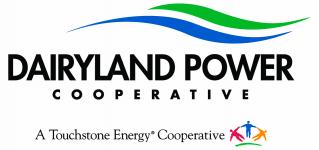Dairyland has a long history of beneficial usage of the coal combustion byproducts (CCBs) from its power plants. In 2020, Dairyland recycled 100 percent of the fly ash captured by the precipitators at the Genoa #3 (G-3) and John P. Madgett (JPM) power plants. This amounted to over 39,000 tons of beneficially reused fly ash in 2020.
“This is the first time in Dairyland history that we have achieved this accomplishment,” said Leif Tolokken, Dairyland Manager, Water and Waste Programs. “The fly ash was diverted from landfill disposal for beneficial reuse, which is a huge milestone for our environmental stewardship program.”
How is the ash recycled?
Dairyland’s fly ash is mostly commonly recycled as a replacement for Portland cement in concrete. Most concrete in our area is 30 percent fly ash, contributing to stronger, less permeable concrete at a lower price. Not only does the recycling of fly ash reduce the amount of waste going to a landfill, it results in community cost savings on road and building projects.
The traditional production of Portland cement uses large amounts of limestone and clay and releases significant amounts of carbon dioxide. Substituting Dairyland’s fly ash creates strong, safe roads while helping reduce greenhouse gas emissions.
In 2021, Dairyland will be providing ash to the three major ready-mix companies in La Crosse, for use in concrete applications.
There have been unique applications of Dairyland’s fly ash over the years, such as its use in the construction of wind turbine projects in Minnesota. Recently, Dairyland’s CCBs have been used in Stone Matrix Asphalt applications on Hwy. 94 near Osseo and on Hwy. 53 near Chetek, Wis. Repurposing the CCBs as a recycled product has the added benefit of displacing raw material usage.
New sustainable agriculture solutions
Dairyland is participating in a pilot project with UW-Extension, testing the effectiveness of repurposing CCBs from its power plants as fertilizer for agriculture applications. The goal is to determine whether using the CCBs from Dairyland’s JPM plant as a soil additive will benefit farmers. This in turn, benefits the environment by recycling a product otherwise destined for the landfill. Beneficial reuse also provides an economic advantage for Dairyland’s cooperative membership, due to the reduction in disposal costs.
“Collaborative efforts like this are crucial to Dairyland’s beneficial usage program and the continued positive environmental impacts,” said Tolokken. “By following a reduce-reuse-recycle commitment, we greatly minimize disposal needs while providing a valued product.”
